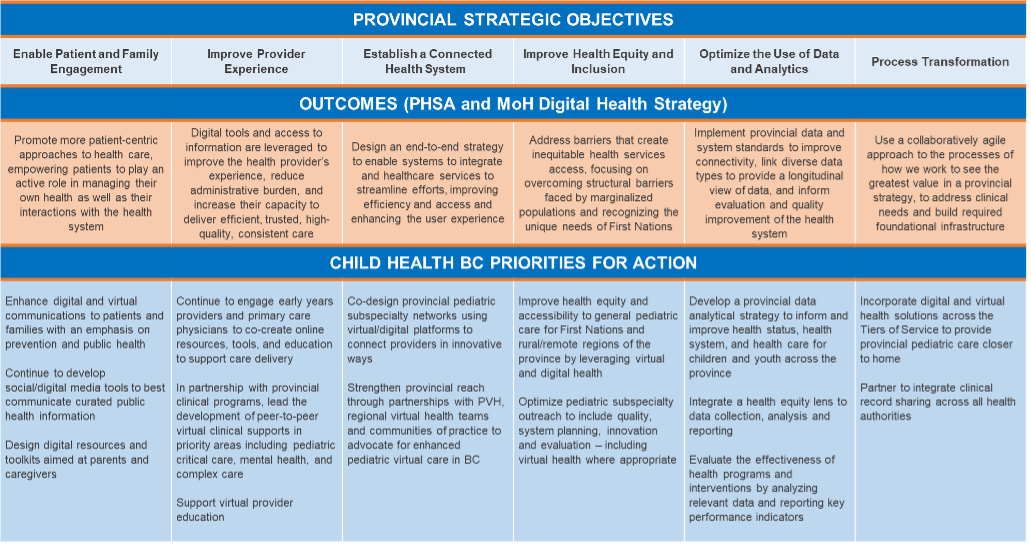Background/ Why Is This Important?
British Columbia's (BC) BC Children’s Hospital (BCCH) provides pediatric sub-specialist care and expertise to children in the province. For children living outside of Vancouver, a trip to BC Children's Hospital for pediatric specialist or sub specialist care can mean significant travel, cost and disruption for the whole family, not to mention the impact on the environment due to the travel. Virtual health care through virtual visits provides an opportunity for children and their families to be seen in their own communities without even leaving home.
Child Health BC, a Health Improvement Network (HIN) of the Provincial Health Services Authority (PHSA) works in partnership with PHSA’s Provincial Virtual Health (PVH) team, BCCH and Regional Health Authorities to lead pediatric initiatives across the province. Virtual health - defined as any health care encounter that is not a face-to-face interaction - enables children to be seen in their homes or communities, seamlessly integrating specialized care into their overall plan. This also included provider to provider interactions, linking BCCH subspecialists with community providers.
Digital health includes virtual health, but also uses information technology and secure communications tools, services and processes. It supports a connected health care system for the benefit and well-being of everyone, including health care providers. Child Health BC remains committed to improving access to digital tools for providers, patients, families and caregivers all across BC.
The Child Health BC Virtual and Digital Framework
In alignment with the Ministry of Health, PHSA Provincial Virtual Health, health authority/agency partners, and BC Children’s Hospital – Child Health BC has designed and co-created a Digital and Virtual Health Framework for pediatric patients and families provincially. The following framework outlines strategic objectives, outcomes and priorities for action. Within each of the actions, there are various projects that Child Health BC is currently engaged in, and some projects that are upcoming.

Where Are We Now?
Child Health BC is advancing this broad provincial framework for supporting the highest quality virtual pediatric care and patient experience throughout BC. Some examples of this framework in action can be described by our work within critical care and pediatric subspecialty networks.
Pediatric Critical Care – Virtual Clinical Support
Through the generous support from the BC Children’s Hospital Foundation, the BC Children’s Hospital Pediatric Intensive Care Unit team (BCCH PICU) and Child Health BC have received funding to partner with regional health authority partners, Indigenous leaders, patients & families to develop a transformed model of pediatric critical care in British Columbia. The vision of this project is to better support the critically ill child while they are in their home community and the clinicians who care for them. With the innovation of PICU Virtual Clinical Support, video assessments and consultation from PICU physicians to community emergency departments has led to improved management of critically ill children at over 40 sites across the province.
Provincial Pediatric Subspecialty Networks – Project ECHO
Child Health BC (CHBC) and BC Children’s Hospital (BCCH) together have demonstrated leadership in the delivery of quality education to providers caring for children and youth across the province. By embracing innovative virtual technology in all our patient programs and services the capacity of local and regional care teams can be enhanced to support care closer to home.
The Project ECHO (Extension for Community Healthcare Outcomes) is a platform to begin to build Provincial Pediatric Subspecialty Networks by providing clinical education, capacity building and mentoring to community care providers across BC.
The Project ECHO model uses a “HUB and SPOKE” framework to promote knowledge exchange between health care specialists, typically located at academic centers (the HUB), and pediatricians, family doctors and care teams at the community level (the SPOKES). Through regularly scheduled virtual educational sessions, Project ECHO creates a supportive community network where local pediatricians and primary care teams can connect with subspecialists and with other pediatricians practicing in similar settings to discuss best practices in care and complex cases managed within their practice.
In 2025, CHBC’s Project ECHO in partnership with the BCCH Diabetes Transformation Project, will launch its initial cycle focusing on pediatric type 1 diabetes. Sessions will be hosted virtually, and participants will have the opportunity to connect through our new digital portal, RIPPLiVE – Resources for Interdisciplinary Pediatric Practice and Learning in a Virtual Environment.